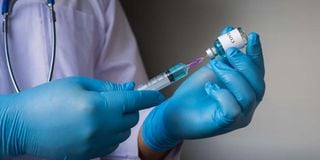Premium
Covid-19 vaccines are almost here, but are we really ready?

A doctor with a vial of Covid-19 vaccine.
What you need to know:
- Eight months after the first cased, we still do not have adequate personal protective equipment (PPE) in hospitals.
- This has resulted in doctors issuing a 21-day strike notice. Yet, procurement and distribution of PPEs is far less complex than that of vaccines.
If vaccines landed at the Jomo Kenyatta International Airport today, what would we do with them?
During a briefing on November 16, Ministry of Health Director-General Patrick Amoth said “we would need to revamp our entire system” to be able to deliver vaccines.
Given our decentralised health care delivery system, it is important to start with a nationwide preparedness assessment. This would determine how prepared counties are to receive, store, distribute and administer Covid-19 vaccines to the prioritised target groups. The hotspots and marginalised communities are of particular interest.
The prioritisation criteria will need to integrate several factors; health workers (cleaners, security guards, and community-based workers qualify under the 3 percent allocation),
pre-existing conditions — defining diseases (such as sickle cell anaemia and other Kenyan context specific drivers of morbidity), economic (expanding access to key sectors, i.e. tourism, agriculture, manufacturing, etc), and habitation/population density(priority given to those who live in informal settlements).
On infrastructure and operating systems, it is highly likely that several types of vaccines will be available in the same area, at the same time.
Sufficient supplies
Coordination is required to ensure that sufficient supplies and doses of each of the approved vaccines are stocked to prevent delays and interruptions. This includes fair distribution to counties based on disease burden and other objective criteria.
Also, since health workers are already limited and overstretched, we should consider recruiting and training another cadre of professionals to conduct outreach and dispense the vaccine.
Last but not least, robust research, monitoring and evaluation system(s) should be established at national, county and community levels, anchored on a strong information technology (IT) infrastructure.
We are behind in this vaccine race. Eight months after the first cased, we still do not have adequate personal protective equipment (PPE) in hospitals.
This has resulted in doctors issuing a 21-day strike notice. Yet, procurement and distribution of PPEs is far less complex than that of vaccines. Kenya should seriously intensify the preparedness efforts because the vaccines will come.




